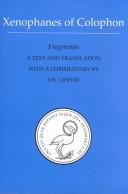| Listing 1 - 8 of 8 |
Sort by
|
Book
ISBN: 3519076268 Year: 1996 Volume: 77 Publisher: Stuttgart Teubner
Abstract | Keywords | Export | Availability | Bookmark
 Loading...
Loading...Choose an application
- Reference Manager
- EndNote
- RefWorks (Direct export to RefWorks)
Xenophanes. --- Senofane --- Xenophanes of Colophon --- Xenophanes van Colophon --- Xenopfanes van Kolofon --- Xenophanes, --- Senofane, --- Xénophane, --- Ξενοφάνης, --- Xenophanēs, --- Ksenofanes,
Book
ISBN: 3760816479 Year: 1983 Publisher: München Artemis
Abstract | Keywords | Export | Availability | Bookmark
 Loading...
Loading...Choose an application
- Reference Manager
- EndNote
- RefWorks (Direct export to RefWorks)
History of philosophy --- Classical Greek literature --- Xenophanes --- Translations into German. --- Xenophanes, --- Senofane --- Xenophanes of Colophon --- Xenophanes van Colophon --- Xenopfanes van Kolofon --- Senofane, --- Xénophane, --- Ξενοφάνης, --- Xenophanēs, --- Ksenofanes,

ISBN: 0802059902 0802085083 9780802059901 0802091172 1281992046 1442658738 1442670932 9786611992040 Year: 1992 Volume: 30 4 Publisher: Toronto: University of Toronto press,
Abstract | Keywords | Export | Availability | Bookmark
 Loading...
Loading...Choose an application
- Reference Manager
- EndNote
- RefWorks (Direct export to RefWorks)
Philosophy --- Early works to 1800. --- -#GROL:SEMI-1-05'-06' --- Mental philosophy --- Humanities --- Early works to 1800 --- Xenophanes. --- Senofane --- Xenophanes of Colophon --- Xenophanes van Colophon --- Xenopfanes van Kolofon --- Xenophanes, --- #GROL:SEMI-1-05'-06' --- Senofane, --- Xénophane, --- Ξενοφάνης, --- Xenophanēs, --- Philosophy, Ancient. --- Philosophie ancienne --- Ksenofanes, --- Philosophy - Early works to 1800.
Book
ISBN: 2859391517 9782859391515 Volume: v. 4 Publisher: Lille: Presses universitaires de Lille,
Abstract | Keywords | Export | Availability | Bookmark
 Loading...
Loading...Choose an application
- Reference Manager
- EndNote
- RefWorks (Direct export to RefWorks)
History of philosophy --- Classical Greek literature --- Melissus, --- Xenophanes, --- Gorgias, --- Senofane, --- Xénophane, --- Ξενοφάνης, --- Xenophanēs, --- Melisso, --- Μέλισσος, --- Melissos, --- Gorgia, --- Gorgiasz --- Γοργίας, --- Ksenofanes, --- Melissus, - Samius --- Xenophanes, - approximately 570 BC-approximately 478 BC --- Gorgias, - of Leontini

ISBN: 3487042169 9783487042169 Year: 1972 Volume: 20 Publisher: Hildesheim: Olms,
Abstract | Keywords | Export | Availability | Bookmark
 Loading...
Loading...Choose an application
- Reference Manager
- EndNote
- RefWorks (Direct export to RefWorks)
Xenophanes, --- Dictionaries, indexes, etc --- Senofane, --- Xénophane, --- Ξενοφάνης, --- Xenophanēs, --- Dictionaries, indexes, etc. --- Ksenofanes, --- Xenophanes, - approximately 570 BC-approximately 478 BC - Dictionaries, indexes, etc --- Xenophanes, - approximately 570 BC-approximately 478 BC
Book
ISBN: 1139235745 1108378153 1108377998 1107028167 Year: 2017 Publisher: Cambridge : Cambridge University Press,
Abstract | Keywords | Export | Availability | Bookmark
 Loading...
Loading...Choose an application
- Reference Manager
- EndNote
- RefWorks (Direct export to RefWorks)
This book demonstrates that we need not choose between seeing so-called Presocratic thinkers as rational philosophers or as religious sages. In particular, it rethinks fundamentally the emergence of systematic epistemology and reflection on speculative inquiry in Hesiod, Xenophanes and Parmenides. Shaul Tor argues that different forms of reasoning, and different models of divine disclosure, play equally integral, harmonious and mutually illuminating roles in early Greek epistemology. Throughout, the book relates these thinkers to their religious, literary and historical surroundings. It is thus also, and inseparably, a study of poetic inspiration, divination, mystery initiation, metempsychosis and other early Greek attitudes to the relations and interactions between mortal and divine. The engagements of early philosophers with such religious attitudes present us with complex combinations of criticisms and creative appropriations. Indeed, the early milestones of philosophical epistemology studied here themselves reflect an essentially theological enterprise and, as such, one aspect of Greek religion.
Pre-Socratic philosophers. --- Knowledge, Theory of. --- Epistemology --- Theory of knowledge --- Philosophy --- Psychology --- Pre-Socratics --- Presocratic philosophers --- Presocratics --- Philosophers --- Hesiod. --- Xenophanes, --- Parmenides. --- Senofane, --- Xénophane, --- Ξενοφάνης, --- Xenophanēs, --- Ksenofanes, --- Hesiod --- Gesiod --- Geziod --- Esiodo --- Hēsiodos --- Hezjod --- Hésiode --- Hesíodo --- Hesiyodos --- הסיודוס --- Ἡσίοδος
Book
ISBN: 1108922872 1108921086 1108922384 9781108921084 110884393X 9781108843935 9781108925846 Year: 2021 Publisher: Cambridge : Cambridge University Press,
Abstract | Keywords | Export | Availability | Bookmark
 Loading...
Loading...Choose an application
- Reference Manager
- EndNote
- RefWorks (Direct export to RefWorks)
Of the Presocratic thinkers traditionally credited with the foundation of Greek philosophy, Xenophanes, Parmenides and Empedocles are exceptional for writing in verse. This is the first book-length, literary-critical study of their work. It locates the surviving fragments in their performative and wider cultural contexts, applying intertextual and intratextual analyses in order to reconstruct the significance and impact they conveyed for ancient audiences and readers. Building on insights from literary theory and the philosophy of literature, the book sheds new light on these authors' philosophical projects and enriches our appreciation of their works as literary artefacts. It also expands our knowledge of the genres in which they wrote, of the literary culture of the Western Greek world, and of the development of Greek poetics from the Archaic to the Classical periods, exposing the influence of these thinkers on more famous Sophistic and Platonic ideas about literature.
Didactic poetry, Greek --- Pre-Socratic philosophers. --- Greek poetry --- History and criticism. --- Xenophanes, --- Empedocles. --- Parmenides. --- Pre-Socratics --- Presocratic philosophers --- Presocratics --- Philosophers --- Empedocles --- Empédocle --- Empedokles --- Senofane, --- Xénophane, --- Ξενοφάνης, --- Xenophanēs, --- Ksenofanes, --- English poetry. --- English literature --- Pre-Socratic philosophers --- History and criticism
Book
ISBN: 9780521762946 0521762944 Year: 2012 Volume: *95 Publisher: Cambridge: Cambridge university press,
Abstract | Keywords | Export | Availability | Bookmark
 Loading...
Loading...Choose an application
- Reference Manager
- EndNote
- RefWorks (Direct export to RefWorks)
"The Greek word eoikos can be translated in various ways. It can be used to describe similarity, plausibility or even suitability. This book explores the philosophical exploitation of its multiple meanings by three philosophers, Xenophanes, Parmenides and Plato. It offers new interpretations of the way that each employs the term to describe the status of their philosophy, tracing the development of this philosophical use of eoikos from the fallibilism of Xenophanes through the deceptive cosmology of Parmenides to Plato's Timaeus. The central premise of the book is that, in reflecting on the eoikos status of their accounts, Xenophanes, Parmenides and Plato are manipulating the contexts and connotations of the term as it has been used by their predecessors. By focusing on this continuity in the development of the philosophical use of eoikos, the book serves to enhance our understanding of the epistemology and methodology of Xenophanes, Parmenides and Plato's Timaeus"--
Pre-Socratic philosophers. --- Plausibility (Logic) --- Resemblance (Philosophy) --- Présocratiques --- Vraisemblance --- Ressemblance (Philosophie) --- Xenophanes, --- Parmenides --- Plato. --- Plato --- Présocratiques --- Similarity --- Knowledge, Theory of --- Identity (Philosophical concept) --- Parmenides. --- Senofane, --- Xénophane, --- Ξενοφάνης, --- Xenophanēs, --- Aflāṭūn --- Aplaton --- Bolatu --- Platon, --- Platonas --- Platone --- Po-la-tʻu --- Pʻŭllatʻo --- Pʻŭllatʻon --- Pʻuratʻon --- Πλάτων --- אפלטון --- פלאטא --- פלאטאן --- פלאטו --- أفلاطون --- 柏拉圖 --- 플라톤 --- Platon --- Platoon --- Ksenofanes, --- Платон --- プラトン --- Xenophanes, - ca. 570-ca. 478 B.C.
| Listing 1 - 8 of 8 |
Sort by
|

 Search
Search Feedback
Feedback About UniCat
About UniCat  Help
Help News
News